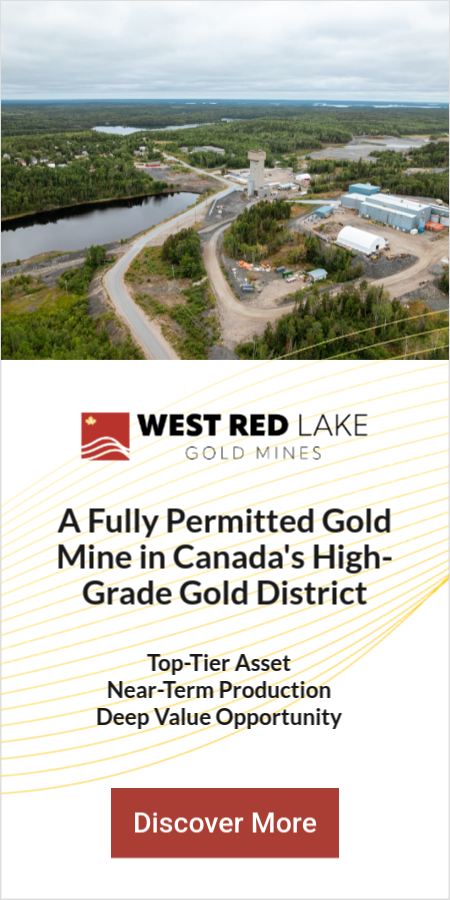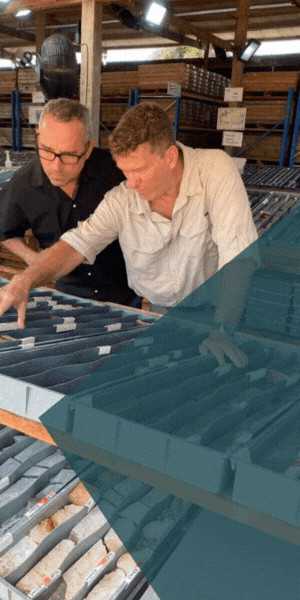Mexico's Mining Industry Under Reform: Legal Challenges and an Uncertain Future

Mexico enacts sweeping mining law reform, sparking industry uncertainty & legal challenges. New rules on concessions, transfers & liability reshape the landscape for investors in Mexico's strategic mining sector.
- Mexico has extensive mineral resources and is a major global producer of metals like silver, lead, and copper. Mining is economically important for Mexico, accounting for 4% of exports.
- However, new mining reforms instituted under President AMLO and his party threaten future investment and growth of the mining sector, especially impacting junior exploration companies.
- The reforms restrict concessions to 30 years (down from 50), require more mandated plans, limit concession areas, and complicate transferring ownership. This increases legal, regulatory, and tax risks for miners.
- Major existing producers are less impacted currently as their assets are exempt from certain new rules. The reforms disproportionately hurt junior explorers focused on early-stage grassroots projects, as new rules make obtaining and keeping concessions much more difficult. This will likely lead to a decline in exploration spending and new discoveries and restrictions, but new expansions and projects face more hurdles. Uncertainty around the reforms is still a concern.
- For investors, Mexican major producers merit caution given policy uncertainty, while most juniors face significant headwinds. However, selective opportunities remain focusing on high-grade, low-cost, cash-flow generating assets.
- Overall, Mexico's attractiveness for mining investment has declined markedly under the new reforms, especially for junior explorers critical to new discoveries.
Mexico’s Rich Mining Heritage
Mexico's mining sector has been a vital part of the economy since pre-Columbian times. When the Spanish colonized Mexico in the 1500s, they aggressively mined precious metals like gold and silver. Today, mining still makes up 1.5% of Mexico's GDP and was worth over 330 billion pesos in 2021 as the sector recovered from the pandemic.
Mexico has a long history of mining and is a top producer of gold, silver, copper and zinc globally. However, mining generates only a small portion of Mexico's tax revenue - around 0.1% of GDP or 0.5% of total government revenue. This is partly because Mexico has a diverse economy, so mining is not a dominant sector - it contributes ~1.5% to GDP and exports and 400,000 jobs. Also, Mexico's taxation of the mining sector is relatively low and fragmented in nature, which limits revenue collection.1
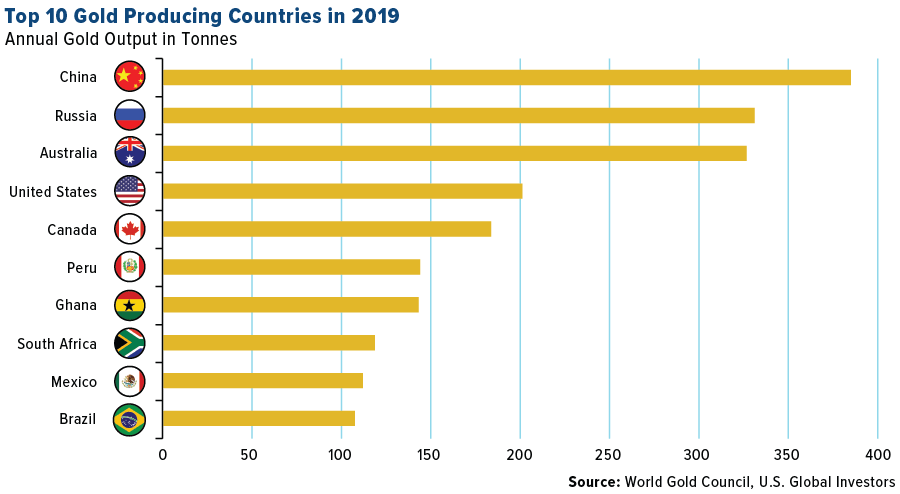

Precious metals continue to drive Mexico's mining sector in the 21st century. Gold makes up the largest share of production value at nearly 30% in 2021. With global uncertainty sending investors to traditional assets like gold, prices have surged, benefiting Mexican gold mining.

Mexico is also the world's largest silver producer, supplying almost 25% of global production in 2021. Most comes from the central state of Zacatecas, home to three of Mexico's five biggest silver mines.
Mexico has long been a major global producer of silver. In 2021, the top silver mines in the country were Peñasquito, San Julián, and Saucito. Peñasquito, operated by Newmont, led with an impressive 31.4 million ounces of silver output. San Julián took second place, producing 16.8 million ounces that year. Saucito, part of Fresnillo's operations, followed closely behind with 12.4 million ounces of production. Overall, silver accounted for around 28% of the total value of Mexico's mining production in 2021, solidifying its place as one of the most valuable mining commodities for the country.
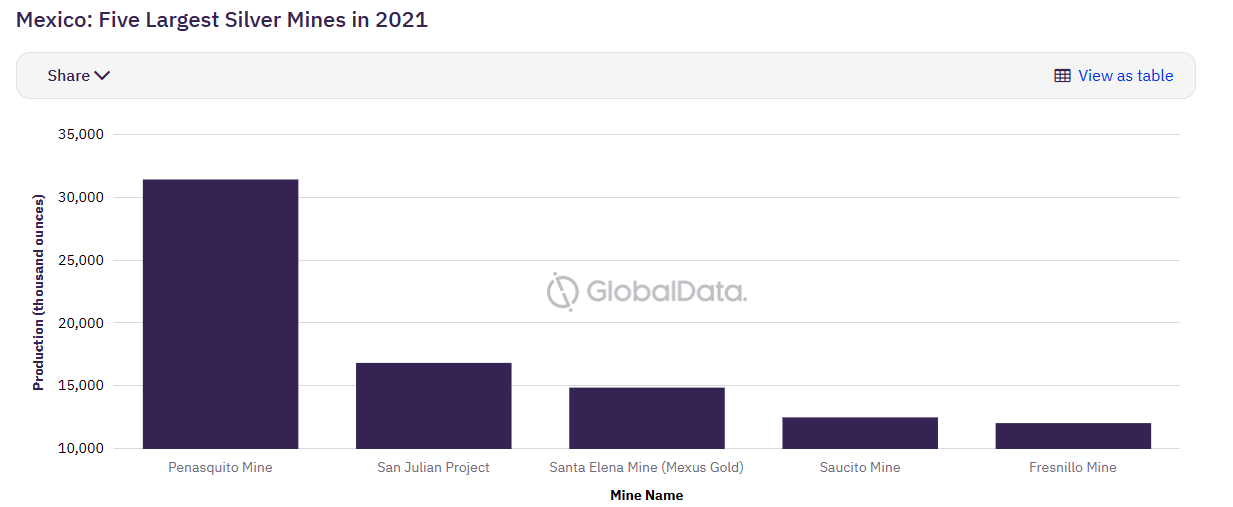
While precious metals have historically dominated, base metals now play a major role in Mexican mining. With the world's fifth largest reserves, Mexico's copper production has nearly tripled since 2010 to become the second most valuable metal mined. Zinc and lead production have also grown over the past decade, together accounting for around 10% of total mining production value. Though focused on precious metals in its early history, Mexico's modern mining sector thrives on a diverse range of metals and minerals.
Table: Mexico Mining Production and Market Size (Figures in USD billions)
Total market size = (total local production + imports) – exports
**2022 estimate of market growth of 2 percent, per IMF forecast
Source: INEGI, OTEA
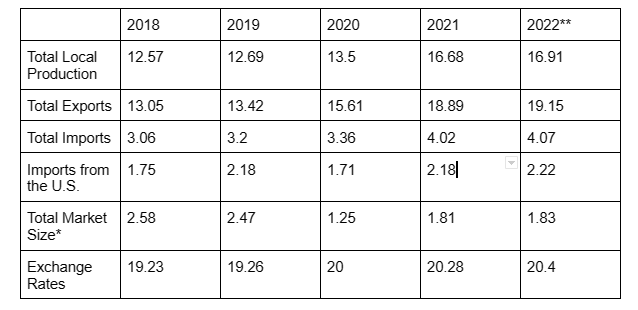
Mexico's Mining Law Reforms: Balancing Economy, Ecology and Community
Mexico recently reformed its Mining Law to better regulate mining activities to protect human rights and the environment. The reform reflects a more inclusive approach considering social impacts and indigenous peoples' rights. Key changes include:
- mandating prior consultation with indigenous communities;
- reducing mining concession terms from 50 to 30 years;
- stricter safety regulations;
- requiring mine closure plans;
- conditioning mining on water availability.
The reform aims to align with international laws on indigenous peoples' rights, distribute economic benefits equitably, and strengthen environmental protection. The reform modified the Mining Law and other related laws like the National Water Law and Environmental Protection Law. Some mining companies and legislators have legally challenged the reform, claiming it violates due process. First Majestic Silver obtained the first injunction against the new law and more legal disputes are expected.
In summary, Mexico reformed its mining law to increase oversight and protect rights and the environment, but the changes face legal opposition from some mining companies.
President Andres Manuel Lopez Obrador championed the reform. Since taking office in late 2018, Lopez Obrador has not granted any new mining concessions in Mexico. He argues past governments granted too many extraction rights to tap the country's resources like gold and copper.
Mexico's general elections will take place on June 2, 2024. The main candidates vying to succeed President AMLO are Claudia Sheinbaum from AMLO's Morena party alliance, Xóchitl Gálvez from the opposition Frente Amplio por México alliance of PAN, PRI, and PRD, Samuel García from the Citizens' Movement party and independent candidate Eduardo Verástegui.
Sheinbaum and Gálvez are seen as the frontrunners in the race and according to a new opinion poll, Claudia Sheinbaum, the presidential candidate for Mexico's ruling Morena party, is now expected to easily win the 2024 election.

Sheinbaum is a close ally of current Mexican President Andres Manuel Lopez Obrador and was until recently mayor of Mexico City. Sheinbaum has vowed to continue Lopez Obrador's legacy if elected president. The poll showed Sheinbaum with 50% support in the four-way race against top contenders. Xochitl Galvez of an opposition party alliance, trailed with only 20% support.

Mexico Enacts Sweeping Changes to Mining Regulation
On May 8, 2023, the Mexican Congress approved a broad set of amendments to the country's mining laws, enacting the most significant overhaul of Mexico's mining regulatory framework in decades. The reforms, published in the Federal Register on May 8 2023 and effective immediately, introduce major changes across multiple areas of mining regulation and have profound implications for mining investors and companies operating in Mexico.
This sweeping mining reform revamps rules around concession awards, renewals, transfers and security interests, while also expanding indigenous consultation requirements and imposing new economic obligations on miners. Concessions will now be awarded via public auctions, with a maximum 30-year initial term and one 25-year renewal, and transfers will require government approval. The reforms also enact new limitations on pledging concessions as collateral and cancel all pending applications.For investors with existing Mexican mining assets, concessions will not be revoked due to the reforms. However, the changes raise uncertainties around future concession renewals and transfers, while also imposing new costs through mandated profit sharing with indigenous groups. Assessing the reform's impacts will be crucial, as will monitoring implementation and any additional regulatory developments.
Key Changes for Investors to Watch
Concession Awards - Shifting to Public Auctions
One of the most pivotal changes is the move to public auctions for awarding mining concessions. A mining concession is an area allocated by a government or other body for the extraction of minerals. It is a license, permit, or other contract that gives private companies the rights to extract minerals from public lands. A concession may include the right to use some existing infrastructure required to carry out a business.
Previously granted on a "first-come, first-served" basis, concessions will now be awarded to the winning bidder in a public tender process. This aims to maximize economic benefits to the state from mining activities. However, it also injects uncertainty for investors, requiring them to compete against rivals to acquire assets.
Added permitting requirements prior to receiving the concession also create risk, as winning bidders must secure all necessary environmental and other clearances before obtaining the concession title. Delays or rejections at this stage could derail investments after significant bids are made. Even after exploration and discovery, the concession could still go to auction instead of the company that did the work.
Social and Environmental impact assessments are required for each mining concession and tender winners shall carry out the social impact study and obtain the environmental impact authorization of their mining activities on nearby populations and lands. Additionally, the tender winners must carry out the prevention, mitigation and compensation measures indicated by the Ministry of Economy.
The reform establishes free and prior consent as a requirement for mining concessions, meaning that companies must meet with residents to discuss the impacts of their projects before receiving permits. It also requires companies to restore the land once a mine closes.
Concession Terms - Shorter and Less Certain Renewals
Another major change is the reduction and reform of concession terms. Initial terms shrink from 50 years to 30 years, while renewal terms drop from 50 years to just 25 years. Moreover, renewal is no longer guaranteed, but subject to a one-time application.
This dramatically tightens concession timeframes for miners. With fewer years assured upfront and renewal uncertain, investments dependent on long-term concession rights face new risks. The economics of capital intensive, long-lifecycle mining projects could be profoundly impacted.
Transferring Titles - New Approval Requirements
Under the reforms, transferring mining concessions now requires prior approval from the Ministry of Economy, a major change from the previous unrestricted regime. This imposes a new layer of regulatory uncertainty on M&A deals or asset sales. Deals may face delays or rejections when seeking mandated approvals, adding friction costs and potentially undermining transactions.
Pledging Concessions as Collateral - New Restrictions
The reforms also limit miners' ability to pledge concessions as collateral for financing. Concessions reportedly can only be pledged when a mine is operating, and only to guarantee obligations tied directly to the concession. Moreover, stringent requirements apply to lenders seeking to enforce on collateral.
These constraints reduce concessions' utility as strategic financing tools. As concessions cannot be readily pledged early on for project development financing, raising capital could become more difficult and expensive.
Indigenous Consultations - Expanded Requirements
In another notable change, the reforms expand indigenous consultation requirements for miners throughout the project lifecycle. More extensive prior consultations with affected groups will be needed regarding environmental and social impacts. Ongoing profit sharing is also mandated, with miners required to pay at least 5% of net profits to neighboring indigenous communities.
While intended to enhance social benefits, expanded consultations and profit sharing add layers of cost and potential disruption. Investors will need to factor in these requirements when assessing project economics and risks.
New Criminal Liability Risks
Additionally concerning for investors, the reforms introduce new categories of crimes related to mining activities. These reportedly expose not just companies but also potentially their personnel to criminal liability over mining operations, separate from administrative sanctions.
This escalation of liability risk creates a more challenging operating environment. While the full implications remain unclear, the spectre of criminal prosecution could raise both costs and uncertainties for mining enterprises.
Assessing Impact Crucial for Investors
For investors holding existing concessions or assets in Mexico, the reforms do not revoke or cancel concessions that were previously granted legally. However, ambiguities around future renewals highlight the need to closely evaluate positions. The shortened terms and uncertainty over extensions could upend expected mine lifecycles and economics.
Additionally, the new requirements around concession transfers will likely impact M&A activity and asset sales. Deals may face greater risks of delays or rejection when seeking mandated government approvals. Investors will need to factor this new friction into transaction planning and pricing.
More broadly, investors seeking new concessions must carefully weigh the new auction processes and risks of losing bids against rivals after making significant upfront investments. The tightened concession terms also reduce long-term revenue visibility from assets.
At the same time, the expanded indigenous consultation and profit sharing obligations could add significantly to operational costs and social risk exposures. On the whole, the reforms appear poised to increase the mining cost base while constraining revenue upsides.
Investors would be wise to thoroughly assess the reform's implications across their portfolios, while closely tracking the Mexican government's implementation and policy stance going forward. With the regulatory ground shifting underfoot, vigilance and proactive engagement will be key to navigating the new mining landscape taking shape in Mexico.
Impacts & Opposition
Mexico’s Reforms Threaten Grassroots Exploration and Junior Miners
Mining companies are rethinking investments in Mexico, the world’s biggest silver producer, after the government pushed through the sweeping regulatory changes. The new reforms disproportionately impact mining exploration and junior companies focused on early-stage grassroots projects in the country.
Exploration spending in Mexico has already dropped nearly 50% from its 2012 peak of $1.2 billion to $633 million in 2022. The abrupt regulatory changes could accelerate this decline if new concessions become difficult or impossible to obtain under the new laws.
These reforms create unacceptable uncertainty for junior explorers who rely on securing exclusive rights to attract private investment for initial exploration. However, the mandated joint ventures and potential auction process make it nearly impossible for juniors to maintain control in Mexico anymore.
Additionally, new bonding requirements prior to exploration add costs, as do opaque partnerships with local communities. With concessions harder to obtain and operate profitably, grassroots exploration led by crucial junior miners in Mexico is set to shrink under the new laws.
This will negatively impact future mineral discoveries and mine development in the country. The abrupt regulatory changes profoundly undermine Mexico's investment climate for early-stage exploration. Many juniors will likely shift focus to other countries rather than face the escalated risks and uncertainty now imposed on the sector by Mexico's mining reforms.
Mexico Mining Law Reform Sparks Industry Uncertainty and Legal Challenges
The Mining Law reform has created uncertainty and opposition from mining companies and industry leaders who view it as unconstitutional. Over 500 legal challenges have been filed against the reform, with some companies already securing suspensions to prevent application of parts of the new law. Opposition argues the reform violates several articles of the Mexican constitution related to rights and private sector participation. Companies say the reform's reductions to concessions and changes to related environmental/waste laws negatively impact the mining industry. Beyond the Mining Law reform, companies like Ganfeng Lithium are challenging separate decisions like concession cancellations. Opposition believes the reform lacked proper legislative process and is fighting it through legal action.
Mexico's Mining Industry Under Reform: Legal Challenges and an Uncertain Future
Mexico's sweeping mining reform marks a major shift in the country's regulatory approach, enacting more stringent oversight to address social and environmental concerns. While intended to enhance protections, the changes have sparked significant uncertainty and legal opposition from mining companies. Investors face a more challenging landscape given shorter concession terms, new transfer restrictions, expanded consultation requirements, and escalated liability risks. The reform's impacts appear most acute for junior explorers critical to new mineral discoveries, potentially accelerating Mexico's decline in early-stage exploration spending. With implementation just beginning, ambiguities abound and the reform's effects will become clearer over time. Yet the abrupt overhaul already represents a seismic change for mining in Mexico. Investors would be prudent to closely monitor developments and proactively assess portfolio risks, while engaging constructively with policymakers given Mexico's strategic importance as a mining jurisdiction. Though pockets of opportunity may remain, Mexico's attractiveness for mining investment has markedly diminished. Navigating the new terrain will require vigilance and agility from mining enterprises hoping to operate successfully under Mexico's transformed regulatory regime.
The mining reform in Mexico presents both challenges and opportunities for companies operating in the country. The general election coming up on June 2, 2024 will be an important moment as the impacts of the reform become clearer. In the months leading up to the election, Crux Investor aims to speak with mining stakeholders in Mexico to get their perspectives on how the reform is affecting their businesses. We will provide updates and analysis on www.cruxinvestor.com/categories/project-locations/mexico, so bookmark the page to stay informed on this evolving situation in Mexico's mining sector.
References:
Analyst's Notes




Subscribe to Our Channel
Stay Informed



















